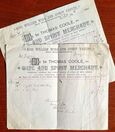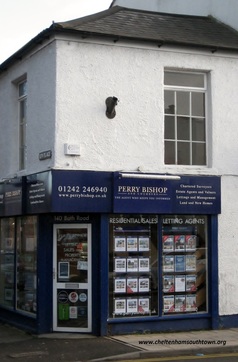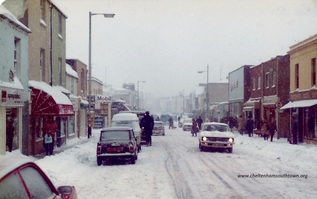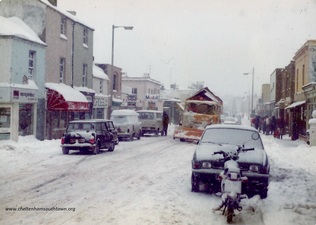Bath Road │3 previous / next │main map / bath road map
140 Bath Road (formerly the King William Inn)Many public houses are named after King William IV since it was he that signed the Beerhouse Act in 1830, enabling anyone to brew and sell beer and cider, which greatly reduced the cost of a license to open a public house.
This Inn, first recorded in 1834, was chosen as the headquarters of a local friendly society founded early in the king’s reign to provide sick pay for working men, before the provision of any state assistance. The society was last mentioned in the local newspapers in 1890. Referred to in 1859 as the King William IV, the landlord at the time was William Witts. He was the inn keeper here at least between 1850-59. The 1861 census lists Thomas Dadswell as the innkeeper. Sharing the home in 1861 was William Flight Power a compositor and later a carver and gilder. Born in Gloucester, he later moved to London and died there in 1899. In 1870 the landlord was listed as Mr Kitchener. By 1881 the landlord was James Thomas Weeks – living here with his wife Susanna (Nicholls) and the Weeks family were here until the mid 1880s. Thomas was born in Dorset in about 1850.  (photo courtesy of Steve Lawrey) (photo courtesy of Steve Lawrey)
In the latter part of the 1800s the pub was owned by Bristol brewers Charles Garton & Co. By about 1885 Thomas Coole was the landlord here with his wife Elizabeth. Born in South Cerney in about 1854, his working life started as a grocer’s assistant. He was the publican of the King William until near the end of the century, when he passed on the licence to Fred Pearce.
By the start of the 20th century the pub was owned by the Bavarian Brewery Company. This company, established in Somerset in 1864, was the first lager brewing company in the country.
In 1896 the King Billy, as it was known by locals, was taken over by Frederick James Pearce and his wife Clara. Born in Leckhampton, Fred was the son of a baker. In fact he started his working life as a baker before coming to the pub. He was a popular landlord with locals, getting himself into bother with the police because of one of them, on one occasion in 1914. When his neighbour, a Mr Clarke, arrived home late one evening after spending the day drilling with the National Reserves, he found no stout in the house and immediately knew who could help. Unfortunately Fred’s good deed was witnessed by the local police and, since providing alcohol after hours was illegal, this led to his appearance in court a few days later. Due to the excellent way Fred usually conducted his Public House, the magistrate fined him a nominal penalty of only 5 shillings. Fred’s wife Clara died at the age of 45, in 1910, and Fred probably continued to run the pub alone until 1927. It then passed into the hands of Charles Mackay, who was here for the next ten years or so. The last licensees were Mr and Mrs Samuel Francis Williams, formerly of the Fox and Hounds. They took over the licence in 1938 but were only here for a few years. Mr Williams died in June 1941, after which his wife Elizabeth ran the pub for a short time until she retired and the license was revoked in 1943. Sadly she died that same year.
From then on the former pub became residential accommodation, until acquired by the adjacent cycle shop in the mid 1950s. During the 1970s a DIY store called Sheridans occupied these premises for the sale of their wrought iron gates. They sold DIY products at their shop a few doors away. The 1980s saw a company called Reprographics occupying this site, specialising in graphic artwork. Toward the end of the twentieth century a succession estate agents occupied this site. The first was Parkers, then from 1995 to 2009 C J Hole, and now Perry, Bishop & Chambers. Researchers: Marilyn West & Eric Miller
Updated: Stuart Manton (Oct 2015) |
|
If you have any further information or photographs of this property please let us know via the contacts page.


